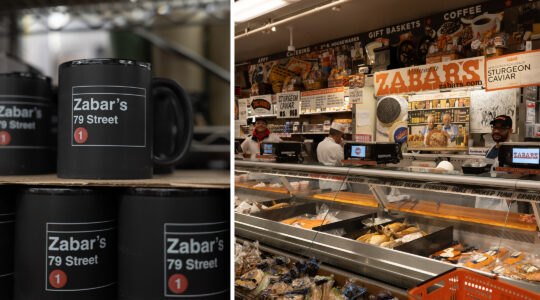Want the cure for wedding jitters? Try getting into the Coterie, the fashion trade show held biannually in New York. At least that’s the method Malka Meiersdorf swears by. This past summer, the 30-year-old Upper West Side resident didn’t have time to fret about every last detail of her August wedding. She was too busy angling for a chance to launch Israeli fashion designer Naama Bezalel’s career in the United States through Milk & Honey Imports, Meiersdorf’s newly formed fashion import and distributor firm.
Back in June, Meiersdorf filled out application papers, prepared catalogs and press kits, and handed the selective Coterie crew a hanging bag filled with the requisite five to six sample clothes. (“Never put it in a box,” she cautions. “If they don’t like what’s on top, they’ll push it aside, and you’re done.”)
But it was one of those “don’t-call-us-we’ll-call-you” sort of situations. And though she knew she had made it past the first round, she hadn’t heard much else. “I was biting my nails at this point,” she says. “I had no idea whether it would happen or not. It was really nerve-wracking.”
It wasn’t until the last minute, just two weeks before the September show, that she got the call she was waiting for: she was in.
The newlywed was ecstatic. “It was a gamble,” she admits. “The sales of your season depend on that show. The exposure is unbelievable.” And once you’re in, you’re in — no more stressful selection processes to contend with.
Three weeks ago, Meiersdorf attended her second Coterie, highlighting Naama Bezalel’s Fall 2008/Winter 2009 collection. Meiersdorf’s colorful booth design got her noticed; she quickly became known as “the one with the funky booth.” In addition to netting sales, top editors — including those at Lucky Magazine — expressed interest in featuring Bezalel’s clothes.
While fashion has always been more than a hobby for Meiersdorf, film and television were the focus of her studies at Tel Aviv University. Upon graduating, the Jerusalem native (her parents made aliyah from America when she was 3) began working as a researcher in Israel’s film industry. During the five years she worked in production, she became enamored with the styling industry. And so she hightailed it to a new job as a fashion stylist, trading her cubicle for an expansive, two-story warehouse filled with clothes — a fantasy come true for the fashion junkie who, as a little girl, would play dress-up with her two younger sisters.
Dressing Israeli actors “was a lot of fun,” she says. “By picking out their look, you build their personality.” Within a year, she got a regular gig outfitting the controversial stars of the satirical TV show “Shy and Dror.”
“I’d say it’s a cynical ‘Saturday Night Live’ … but obviously you can’t compare,” she says.
When the show took a seasonal break, the then 24-year-old hopped on a plane to Brooklyn, where her grandparents had an apartment. She landed a job at the Soho flagship store of British retailer Joseph, a high-end women’s wear clothing line known for its pants. The part-time job quickly morphed into a full-time gig and before long, she was in charge of publicity and managing the Soho store.
While she loved the clothing, she was less enthusiastic about the vibe. “When you walk into a store like Prada, everyone looks down at you. I felt bad being that person.” She stuck around for two years, hoping to learn how to promote Israeli fashion in the U.S. Her goal: to become a clearinghouse for Israeli designers, acting as the multicultural middleman who possesses the knack for translating Israeli designs into clothing that will satisfy the unique needs of the American market.
Meiersdorf decided to stay in New York, where she worked for Roni Rabl, an Israeli company known for high-end Missy knitwear, and later as a sales manager in a multi-line showroom. She had been toying with the idea of launching her own business for some time when she met her future husband. She soon decided to take a double plunge. “I felt it was time for new beginnings,” she says.
Support the New York Jewish Week
Our nonprofit newsroom depends on readers like you. Make a donation now to support independent Jewish journalism in New York.
In July, she flew to Israel to meet with designer Naama Bezalel, known for her feminine, ‘50s-inspired dresses, high-waist skirts and soft satin and cotton blouses with vintage touches. Bezalel’s line, Meiersdorf was convinced, could easily be popularized in the U.S. Bezalel owns six retail stores in Israel, and is a recognizable name in Tel Aviv. “I’ve been wearing her clothes for about 10 years now,” Meiersdorf says.
In addition to handling orders and collecting payment from American retailers, Meiersdorf helped Bezalel choose fabrics and tailor her collection to the American market. Bezalel’s pants, for example, posed a problem. “I knew they wouldn’t sell,” Meiersdorf says. “The rise was way, way too low, and the leg too wide.” For Fall/Winter ’08-’09, Bezalel designed three new pant styles, including a medium rise slit-pocket pant with a boot-cut leg, dubbed the “slimming professional work pant.”
After her first Coterie in September, Meiersdorf channeled her inner Willy Loman and visited trendy boutiques in Park Slope, the Village and even Hoboken, persuading owners to take on Bezalel’s line. She even flew to California, rented a car and traveled throughout the San Francisco Bay area.
Thankfully, she was a lot more successful than the Arthur Miller character. Bezalel’s collection, which runs from $150-$400, is currently selling in about 25 stores nationwide, including nine in New York.
The dresses and skirts are hot items, she says. “Each store picks and chooses, creating their own look. It’s funny to see how certain looks work for certain stores.”
Not all merchants that carry the Naama Bezalel line are Jewish. “Her clothes have a very cool hipster look,” Meiersdorf says.
For now, Meiersdorf’s Upper West Side apartment doubles as her showroom. “During Shabbat dinners, friends will rummage through the racks of clothes,” she says. She plans to expand Milk & Honey Imports by representing additional Israeli designers and opening a showroom.
“I’m very passionate about Israeli fashion,” she says. “There’s a big guilt factor in my having left Israel. My entire family is there. I was in the army. I feel like Israel is my home. So Israeli fashion is my cause right now.”
Profit Motive is an occasional series profiling Jewish entrepreneurs who are making their mark here in a variety of business ventures.




